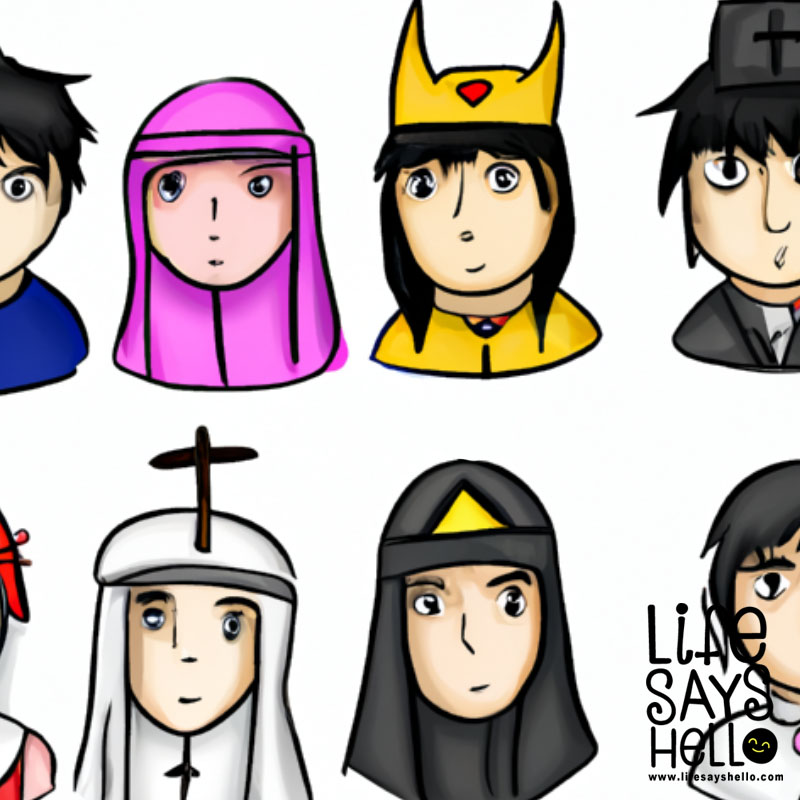Is Islam Older Than Christianity? Exploring the Origins and Shared History of Two Abrahamic Faiths

The age-old question of whether Islam is older than Christianity often sparks curiosity and debate, but understanding the historical context and shared beliefs of these two Abrahamic faiths can provide a deeper appreciation for their similarities and differences.
Throughout history, the relationship between Christianity and Islam has been a complex and multifaceted one. As two of the world's largest religions, both faiths have had a significant impact on the course of human history, shaping cultures, societies, and even political landscapes. Despite their differences, both Christianity and Islam share a common origin, as they are considered Abrahamic faiths, tracing their roots back to the biblical figure Abraham. In this article, we will explore the origins of these two religions, their shared history, and the key similarities and differences between them to answer the question: is Islam older than Christianity?
1. Historical Background
To understand the age of Islam and Christianity, it is essential to delve into their historical backgrounds and the contexts in which they developed.
Christianity's Development
Christianity emerged in the 1st century CE, evolving out of Judaism. The religion is based on the life and teachings of Jesus Christ, a Jewish preacher and healer who lived in the Roman province of Judea. Jesus' teachings focused on love, compassion, and the coming of the Kingdom of God, and he attracted a following of disciples who believed him to be the long-awaited Messiah. After Jesus' crucifixion and subsequent resurrection, his followers began spreading his teachings, forming the basis of the Christian faith.
Over time, Christianity spread throughout the Roman Empire and beyond, eventually becoming the official religion of the empire in the 4th century CE. As the religion continued to grow and evolve, it developed its own distinct identity, separating it from its Jewish roots.
Islam's Development
Islam, on the other hand, emerged in the 7th century CE, more than 600 years after the birth of Christianity. The religion was founded by the Prophet Muhammad, who was born in Mecca, a city in present-day Saudi Arabia. Muslims believe that Muhammad received revelations from God through the angel Gabriel, which were later recorded in the Quran, Islam's holy book.
Muhammad's teachings emphasized the oneness of God (Allah in Arabic), the importance of submitting to God's will, and the need for a just and moral society. As his following grew, Muhammad and his followers faced persecution in Mecca, leading to their migration to Medina in 622 CE, an event known as the Hijra. This journey marked the beginning of the Islamic calendar and the establishment of the first Islamic community.
From Medina, Islam spread rapidly across the Arabian Peninsula and beyond, eventually establishing a vast empire that spanned from Spain to India. Today, Islam is the second-largest religion in the world, with over 1.8 billion followers.
Given the historical timelines of both religions, it is clear that Islam is not older than Christianity. However, it is older than some forms of Christianity that emerged later, as both faiths continued to evolve and develop over time.
2. Views on Jesus
One of the key differences between Christianity and Islam lies in their respective views on Jesus Christ.
Christian Beliefs About Jesus
In Christianity, Jesus is regarded as the Son of God and the Messiah, a savior figure who was prophesized in the Hebrew scriptures. Christians believe that Jesus was born of a virgin, lived a sinless life, performed miracles, and taught about the coming of the Kingdom of God. They also believe that Jesus' death on the cross served as a sacrifice for the sins of humanity, and that his resurrection from the dead demonstrated his divine nature and victory over sin and death. As such, Jesus occupies a central role in Christian theology, and his life, death, and resurrection form the basis of the Christian faith.
Islamic Beliefs About Jesus
In Islam, Jesus (known as Isa in Arabic) is also highly regarded, but his role and significance differ from those in Christianity. Muslims believe that Jesus was a prophet and the Messiah, but not the Son of God or divine in any way. Instead, Jesus is considered one of the many prophets sent by God throughout history to guide humanity, including figures such as Adam, Noah, Abraham, Moses, and Muhammad.
Muslims believe that Jesus was born of a virgin and performed miracles, but they reject the idea that he was crucified and resurrected. Instead, Islamic tradition holds that Jesus was taken up to heaven by God and will return to Earth in the future to restore justice and fairness. While Jesus is an important figure in Islam, his role is ultimately subordinate to that of Muhammad, who is considered the final and most important prophet.
3. Sacred Scriptures
Another key difference between Christianity and Islam lies in their sacred scriptures, which serve as the foundations of their respective beliefs and practices.
The Bible: Christianity's Holy Book
The Bible is the holy book of Christianity, consisting of two main sections: the Old Testament and the New Testament. The Old Testament, also known as the Hebrew Bible, contains the sacred writings of the Jewish people and includes books such as Genesis, Exodus, and Psalms. The New Testament, on the other hand, focuses on the life and teachings of Jesus Christ and includes the four Gospels, the Acts of the Apostles, and various letters written by early Christian leaders.
Christians believe that the Bible is the inspired word of God, and its teachings serve as the basis for Christian doctrine and practice. The Bible has been translated into numerous languages and has had a profound impact on literature, art, and culture throughout history.
The Quran: Islam's Holy Book
The Quran is the holy book of Islam, consisting of 114 chapters known as surahs. Muslims believe that the Quran contains the revelations given to Muhammad by God through the angel Gabriel over a period of 23 years. The Quran is written in Arabic, and its language is considered to be of unparalleled beauty and eloquence.
Muslims regard the Quran as the literal word of God, and its teachings form the foundation of Islamic beliefs and practices. In addition to the Quran, Muslims also refer to the Hadith, a collection of sayings and actions attributed to Muhammad, as a source of guidance and instruction.
Muslims believe that the original Gospel (Injil) given to Jesus was corrupted or altered by later Christians, and that the Quran serves as a restoration of the true message of God. As such, the Quran is considered the final and most authoritative revelation of God's will.
4. Branches and Sects
Both Christianity and Islam have developed various branches and sects over time, due to doctrinal and political disputes within their respective communities.
Christianity's Branches
The major branches of Christianity are Catholicism, Orthodoxy, and Protestantism. These branches emerged as a result of theological disagreements and historical events that shaped the course of Christian history.
Catholicism is the largest branch of Christianity, with over 1.2 billion followers worldwide. The Catholic Church is headed by the Pope and is characterized by its hierarchical structure, rich liturgical traditions, and emphasis on the sacraments.
Orthodoxy, also known as Eastern Orthodoxy or the Orthodox Church, is the second-largest branch of Christianity, with approximately 260 million followers. The Orthodox Church is characterized by its emphasis on apostolic tradition, liturgical richness, and the veneration of icons.
Protestantism is a broad term that encompasses a wide range of Christian denominations, including Lutheranism, Calvinism, Anglicanism, and Methodism, among others. The Protestant Reformation, which began in the 16th century, led to the emergence of these denominations as a response to perceived corruption and theological errors within the Catholic Church. Protestantism is characterized by its emphasis on the authority of the Bible, the priesthood of all believers, and the importance of individual faith.
Islam's Branches
The major branches of Islam are Sunni and Shia, which emerged as a result of political and theological disputes within the Islamic community.
Sunni Islam is the largest branch of Islam, comprising approximately 85-90% of the global Muslim population. Sunnis believe in the importance of the community in interpreting and implementing the teachings of Islam and follow the example of the Prophet Muhammad and his companions (known as the Sahabah).
Shia Islam, on the other hand, represents around 10-15% of the global Muslim population and is characterized by its belief in the divinely-appointed leadership of the Imams, who are the descendants of Muhammad through his cousin and son-in-law, Ali. Shias believe that the Imams possess spiritual and political authority, and their teachings and interpretations of Islam hold significant weight within the Shia community.
5. Interactions and Shared Beliefs
Throughout history, Christianity and Islam have influenced and interacted with each other in various ways, both peacefully and violently. Despite their differences, the two faiths also share common values and beliefs that have shaped their respective traditions.
Influences and Interactions
Christianity and Islam have a long history of interaction, dating back to the early days of Islam when Christian communities existed within the Arabian Peninsula. Over time, the two faiths have influenced each other in various ways, such as through the exchange of ideas, the sharing of religious texts, and the development of art and architecture.
At times, the relationship between Christianity and Islam has been marked by conflict, such as during the Crusades, when Christian and Muslim forces fought for control of the Holy Land. However, there have also been periods of peaceful coexistence and mutual respect, such as during the Islamic Golden Age, when Christian, Jewish, and Muslim scholars worked together to advance knowledge in various fields.
Shared Beliefs and Values
Despite their differences, Christianity and Islam share several key beliefs and values, which have shaped their respective religious traditions.
Monotheism: Both Christianity and Islam are monotheistic faiths, believing in the existence of one God who is the creator and sustainer of the universe. While their conceptions of God differ in some respects, such as the Christian belief in the Trinity, both faiths emphasize the importance of worshiping and submitting to the one true God.
Ethical Principles: Both Christianity and Islam share a commitment to ethical principles and moral values, such as the importance of compassion, justice, and forgiveness. These values are often derived from the teachings of Jesus and Muhammad, as well as from the sacred scriptures of each faith.
Prophetic Traditions: Both Christianity and Islam believe in the importance of prophets as messengers of God, who were sent to guide humanity and reveal divine truths. While the specific prophets recognized by each faith differ, both traditions hold that these figures played a crucial role in shaping human history and understanding God's will.
Eschatology: Both Christianity and Islam have a strong emphasis on eschatology, or the study of the end times. Both faiths believe in the eventual return of Jesus, the resurrection of the dead, and the final judgment, when the righteous will be rewarded and the wicked will be punished.
Conclusion
In conclusion, while Islam is not older than Christianity, both religions share a common origin in the Abrahamic tradition and have developed alongside each other throughout history. By exploring the historical context, shared beliefs, and key differences between Christianity and Islam, we can gain a deeper appreciation for the richness and complexity of these two world religions.
Ultimately, understanding the similarities and differences between these faiths can help promote dialogue, tolerance, and mutual respect among their followers, fostering a more inclusive and harmonious world.




Comments